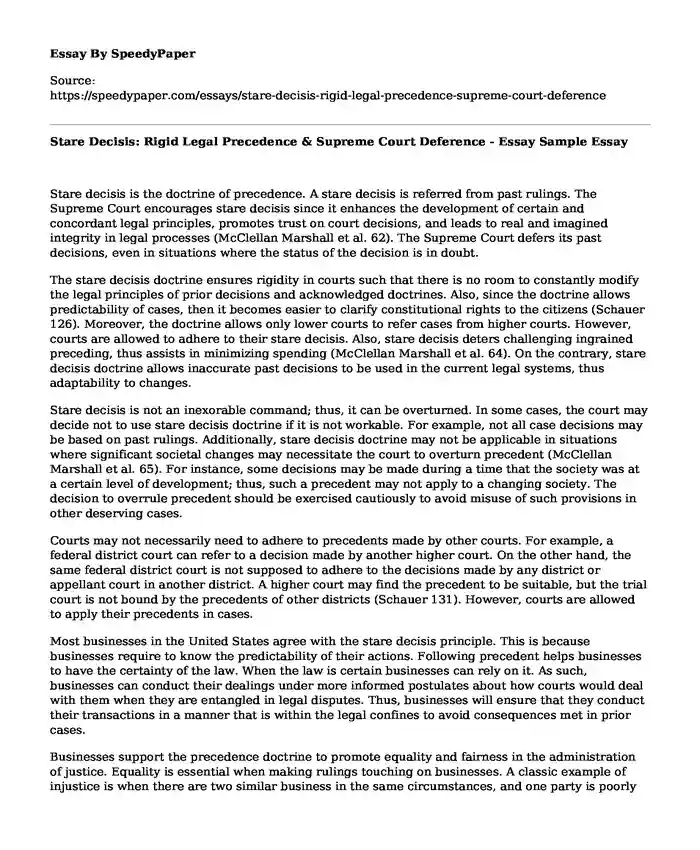
| Type of paper: | Essay |
| Categories: | Law Court system |
| Pages: | 3 |
| Wordcount: | 679 words |
Stare decisis is the doctrine of precedence. A stare decisis is referred from past rulings. The Supreme Court encourages stare decisis since it enhances the development of certain and concordant legal principles, promotes trust on court decisions, and leads to real and imagined integrity in legal processes (McClellan Marshall et al. 62). The Supreme Court defers its past decisions, even in situations where the status of the decision is in doubt.
The stare decisis doctrine ensures rigidity in courts such that there is no room to constantly modify the legal principles of prior decisions and acknowledged doctrines. Also, since the doctrine allows predictability of cases, then it becomes easier to clarify constitutional rights to the citizens (Schauer 126). Moreover, the doctrine allows only lower courts to refer cases from higher courts. However, courts are allowed to adhere to their stare decisis. Also, stare decisis deters challenging ingrained preceding, thus assists in minimizing spending (McClellan Marshall et al. 64). On the contrary, stare decisis doctrine allows inaccurate past decisions to be used in the current legal systems, thus adaptability to changes.
Stare decisis is not an inexorable command; thus, it can be overturned. In some cases, the court may decide not to use stare decisis doctrine if it is not workable. For example, not all case decisions may be based on past rulings. Additionally, stare decisis doctrine may not be applicable in situations where significant societal changes may necessitate the court to overturn precedent (McClellan Marshall et al. 65). For instance, some decisions may be made during a time that the society was at a certain level of development; thus, such a precedent may not apply to a changing society. The decision to overrule precedent should be exercised cautiously to avoid misuse of such provisions in other deserving cases.
Courts may not necessarily need to adhere to precedents made by other courts. For example, a federal district court can refer to a decision made by another higher court. On the other hand, the same federal district court is not supposed to adhere to the decisions made by any district or appellant court in another district. A higher court may find the precedent to be suitable, but the trial court is not bound by the precedents of other districts (Schauer 131). However, courts are allowed to apply their precedents in cases.
Most businesses in the United States agree with the stare decisis principle. This is because businesses require to know the predictability of their actions. Following precedent helps businesses to have the certainty of the law. When the law is certain businesses can rely on it. As such, businesses can conduct their dealings under more informed postulates about how courts would deal with them when they are entangled in legal disputes. Thus, businesses will ensure that they conduct their transactions in a manner that is within the legal confines to avoid consequences met in prior cases.
Businesses support the precedence doctrine to promote equality and fairness in the administration of justice. Equality is essential when making rulings touching on businesses. A classic example of injustice is when there are two similar business in the same circumstances, and one party is poorly treated. For instance, it would be unfair for a court to charge a business more fine to one business for a similar crime committed by another business entity.
Stare decisis is used in most states in the U.S. The principle allows courts to use prior rulings when making current decisions. It helps to save time and enables the predictability of the law. Most businesses agree with stare decisions because it serves to ensure equality in the way cases are determined. Also, it helps businesses to know the predictability of their actions. Thus, businesses become orderly and more responsible.
Works Cited
McClellan Marshall, John et al.. "Stare Decisis and Common Sense in American Civil and Criminal Jurisprudence." Studia Iuridica Lublinensia, vol.27, no.1, 2018, pp. 60-66. https://doi.org/10.17951/sil.2018.27.1.59
Schauer, Frederick. "Stare Decisis—Rhetoric and Reality in the Supreme Court." The Supreme Court Review, vol.2018, no.1, 2019, pp.121-143. https://doi.org/10.1086/702560
Cite this page
Stare Decisis: Rigid Legal Precedence & Supreme Court Deference - Essay Sample. (2023, Nov 15). Retrieved from https://speedypaper.com/essays/stare-decisis-rigid-legal-precedence-supreme-court-deference
Request Removal
If you are the original author of this essay and no longer wish to have it published on the SpeedyPaper website, please click below to request its removal:
- Essay Example in Criminal Law: Comparison of Crime Rate in NYC and China
- Free Essay. International Crime Witness
- Free Sample on Determining EEO And Affirmative Action Compliance
- Essay Sample on Students Should Not Have Guns in Texas Schools
- Enhancing School Safety and Gun Control: Addressing the Santa Fe School Shooting in Texas - Essay Example
- Pledge of Allegiance: Origin and Evolution - Essay Sample
- Paper Example on Criminal Justice Process: Investigating Crime to Release From Correctional Services
Popular categories




